2020 Society of Professors of Education Outstanding Book Award winner
Autoethnography: Process, Product, and Possibility for Critical Social Research provides a short introduction to the methodological tools and concepts of autoethnography, combining theoretical approaches with practical ‘how to’ information. Written for social science students, teachers, teacher educators, and educational researchers, the text shows readers how autoethnographers collect, analyze, and report data. With its grounding in critical social theory and inclusion of innovative methods, this practical resource will move the field of autoethnography forward.
Cuprins
Preface
Acknowledgments
About the Authors
PART I • HISTORIES AND APPLICATIONS OF AUTOETHNOGRAPHY AS CRITICAL SOCIAL RESEARCH
Chapter 1. Autoethnography: Introduction and Overview
Focus Your Reading
Histories of Autoethnography
Defined Functions of Autoethnography Applied as Critical Social Research
Concluding Thoughts
Group Activity
Individual Activity
Sites for Students to Consider
Chapter 2. Mining and Priming Critical Social Theory for Autoethnography
Focus Your Reading
What Is Theory?
What Is Social Theory?
What Is Critical Social Theory?
Emergent Critical Social Theorizing in Autoethnography
Guidelines for Infusing Theory into Autoethnography
Concluding Thoughts
Individual Activity
Individual and Two-Person Group Activity
Sites for Students to Consider
PART II • DOING AUTOETHNOGRAPHY: FROM BRAINSTORMING TO GUIDING PROCESS
Chapter 3. First Guiding Process: Problematizing What You Know for New-Self Insight
Focus Your Reading
Theoretical Foundation
Designing Autoethnography: Problematizing Data Collection and Analysis Strategies
Deciding to Do Autoethnography: Problematizing a Linear Approach to Self-Exploration
Directing Autoethnography: Problematizing Uniformed Applications
Problematizing Ethics and Institutional Review Board Approval
Concluding Thoughts
Individual Activity
Individual and Group Activity
Sites for Students to Consider
Chapter 4. Second Guiding Process: Legitimizing Autoethnography With Three Approaches
Focus Your Reading
Theoretical Foundations of Legitimizing
Reflexivity
Three Approaches to Legitimizing Autoethnography
Concluding Thoughts
Group Activity
Individual Activity
Sites for Students to Consider
Chapter 5. Third Guiding Process: Synthesizing New-Self Insights With MICA
Focus Your Reading
What Is Qualitative Meta-Synthesis?
What Is Meta-Autoethnography?
Introducing MICA
Sample Application of the MICA Method
Synthesis as Translation: A Reciprocal Analogy
Concluding Thoughts
Group Activity
Individual Activity
Sites for Students to Consider
PART III • THE FUTURE OF AUTOETHNOGRAPHY: A PRISM OF POSSIBILITY
Chapter 6. The Possibility of Autoethnography as Critically Reflexive Action Research
Focus Your Reading
The Origins and Elements of CRAR
Selection Process for Autoethnography Literature to Consider as CRAR
Finding Autoethnographies Demonstrating CRAR
Applying the CRAR Checklist/Rubric to Laubscher and Powell
Applying the CRAR Checklist/Rubric to Hughes
Concluding Thoughts: Toward Communicative Competence and Communicative Praxis
Concluding Thoughts
Group Activity
Individual Activity
Sites for Students to Consider
Chapter 7. Anticipating the Future of Autoethnography as Critical Social Research
Focus Your Reading
Growth and Creativity, Yet Sustained Skepticism and Criticism
Taking Healthy Risks: Growth in Autoethnographic Dissertations
Addressing Gaps in Autoethnography for the Future of the Genre
Publishing Autoethnography: Journals and Academic Publishers
Toward an Evolving Online Reading List for Autoethnography
Appendixes
A. Autoethnography Data Representation: An Example
B. Sample Undergraduate Mini-Autoethnography Student Work
C. Sample Mini-Autoethnography Midterm Assignment— Undergraduate Level
D. Sample Syllabus for an Autoethnography Course—Graduate Level
Glossary
References
Index
Despre autor
Sherick Hughes, Ph D, is a Full Professor in the School of Education at the University of North Carolina (UNC) at Chapel Hill. In addition to numerous publications in professional journals, he is the co-author of Autoethnography: Process, Product and Possibility for Critical Social Research (2020 Book Award, national Society of Professors of Education), Black Hands in the Biscuits Not in the Classrooms: Unveiling hope in a struggle for Brown’s promise (2007 AESA Critics’ Choice Book Award, and co-author of The Evolving Significance of Race: Living, Learning, and Teaching (2014 AESA Critics’ Choice Book Award). For more than 20 years, he has been investigating and addressing equity issues at the intersection of theory, policy, and practice. He has applied a variety of research methods that inform international dialogues on how inequitable social structures are developed, reproduced, and resisted; including the processes of learning and unlearning intergroup biases. He has taught courses in research methodology, equity, urban education, and intercultural education to both undergraduate and graduate students. He is recognized as one of the pre-eminent scholars of autoethnography methods, critical race studies and black education, and social context of schooling in urban and rural settings. Currently, he is a consultant and lecturer on trends in educational research, autoethnography, structural racism, and anti-racist education. His work was recognized by the American Educational Research Association (i.e., 2016 Distinguished Scholar Award; 2013 Division-G Early Career Award), and the Harvard Family Involvement Network of Educators. His work is used widely (for example, to inform an educational equity argument before the Supreme Court of North Carolina; and to inform popular culture Netflix series, “The Patriot Act” hosted by Hasan Minaj). He holds a doctorate in Education from UNC-Chapel Hill, a master’s degree in Communication Studies from Wake Forest University, a master’s degree in Public Administration from UNC at Chapel Hill, and a bachelor’s degree in Communication Studies from UNC at Wilmington. To learn more about Autoethnography: Process, Product, and Possibility for Critical Social Research, click here: https://us.sagepub.com/en-us/nam/autoethnography/book241765 or here: https://methods.sagepub.com/book/autoethnography To learn more about Sherick Hughes, his related SAGE book video, click here: https://methods.sagepub.com/video/sherick-hughes-discusses-autoethnography












